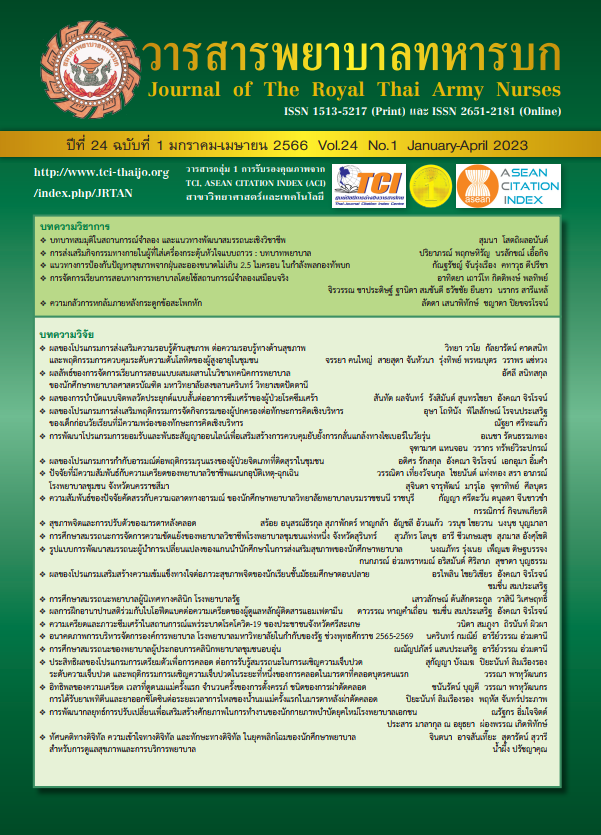The Development of Adaptive Strategy for Enhancing Work Potential of New Age Physical Therapists of Private Hospital
Keywords:
The adaptive strategy, Work potential, New age physical therapistsAbstract
The purpose of this research were 1) to study of work potential of new age physical therapists, 2) to develop adaptive strategy for enhancing work potential of new age physical therapists, 3) to study the effect of adaptive strategy for enhancing work potential of new age physical therapists, and 4) to study the satisfaction of the experimental group and the related significant group toward the adaptive strategy for enhancing work potential of new age physical therapists after the follow-up by using focus group. The adaptive strategy model included 5 stages: the data perception stage, data analysis stage, planning stage, Implementation process and the evaluation and improvement process to enhance work potential of new age physical therapists. The work potential of new age physical therapists consisted of professional knowledge, information literacy, critical flexibility, analytical thinking and decision making and innovation thinking. The adaptive strategy for enhancing work potential of new age physical therapists was developed by applying three psychological concepts: transformative learning, Information processing and cognitive strategies. The research results showed that the development of adaptive strategies could significantly enhance the work potential of new age physical therapists after the experiment and after the follow-up.
Downloads
References
Neufeldt AH, Mathieson R. Empirical Dimensions of Discrimination Against Disabled People. Health Hum Rights. 1995;1(2) : 174-89.
Metheesuwapab S. and Wijitwanna S. Human resource Potentialities in Organization: Evaluation and Development. Siam academic review. 2019;0(2) : 1-10. (in Thai)
Duangjai P. Team Based Learning: Learning Strategy in Nursing Education toward the Development of the Twenty-First Century Learning Skill. Journal of The Royal Thai Army Nurses. 2022;23(1) : 23-32. (in Thai)
Inchaithep S. Transformative Learning: A Nursing learning management in clinics. Journal of Health Sciences Scholarship. 2019;6(1) : 1-10. (in Thai)
Practice of the Physical Therapy. Ratchakitjanubeksa book 121; 2004: 52-70.
Nualnetr N. Physical Therapists and Primary Health Care Services. The Thai Journal of Primary Care and Family Medicine. 2009;1(1) : 43-6. (in Thai)
Watthanabut B. Human Capital Potential Development In 21st Century. Dhammathas Academic Journal. 2016;16(3) : 163-76. (in Thai)
Mezirow J. Learning as transformation: Critical perspectives on a theory in progress. San Francisco, CA: The Jossey-Bass higher and adult education series; 2000.
Klausmeier. H. J. Educational psychology. 5thed. New York: Harper & Row; 1985.
Creswell J.W. Research Design Qualitative, Quantitative and Mixed Methods Approaches. 2thed. Thousand Oaks, CA: Sage; 2003.
Jose J. Canas, Inmaculada F. and Ladialao S. Cognitive flexibility. Spain: University of Granada; 2015.
Marquardt, M. J. Action learning in action: Transforming problems and people for world-class organizational learning. Palo Alto, Calif: Davies-Black; 1999.
Prajankett O. An educational innovative organization: A new choice of educational Administration. Journal of The Royal Thai Army Nurses. 2014;15(1) : 45-51. (in Thai)
Akkadechanunt T. Nurses’ Competency and Public Healthcare Innovations in Thailand 4.0 Era. Journal of Thailand Nursing and Midwifery Council. 2019;34(1) : 5-13. (in Thai)
Downloads
Published
How to Cite
Issue
Section
License
Copyright (c) 2023 Journal of The Royal Thai Army Nurses

This work is licensed under a Creative Commons Attribution-NonCommercial-NoDerivatives 4.0 International License.
บทความหรือข้อคิดเห็นใดใดที่ปรากฏในวารสารพยาบาลทหารบกเป็นวรรณกรรมของผู้เขียน ซึ่งบรรณาธิการหรือสมาคมพยาบาลทหารบก ไม่จำเป็นต้องเห็นด้วย
บทความที่ได้รับการตีพิมพ์เป็นลิขสิทธิ์ของวารสารพยาบาลทหารบก
The ideas and opinions expressed in the Journal of The Royal Thai Army Nurses are those of the authors and not necessarily those
of the editor or Royal Thai Army Nurses Association.






